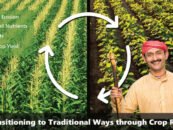About ITC
ITC originally known as the Imperial Tobacco Company of India Limited was incorporated in the year 1910. ITC remarkably transformed from a tobacco and Hotels Company to one of India’s fastest growing FMCG companies and the country’s 3rd largest food company in a span of a decade.
ITC started its Agri-Business division in 1990, which was set up to leverage its agri-sourcing competencies and also support in the export of agricultural commodities. The agri‐business division of ITC is focussed on exports and domestic trading of feed ingredients, food grains, marine products, processed fruits and coffee. ITC is the second largest exporter of agri‐products with presence in 90 different countries.
ITC is one of India’s largest integrated agri business enterprises with significant presence across every node of the agri value chain. The leadership position of ITC’s Agri Business is anchored in its strong and enduring partnerships with farmers across the country, which has revolutionised the agricultural sector in rural India.
ITC Agri Business is one of the leading domestic players and exporters of numerous agricultural commodities. It works with farmers to improve the productivity and quality of various crops and sources the finest of Grains, Oil Seeds, Pulses and a range of value-added agri products such as Processed Fruits, Coffee and Shrimps across multiple geographies in India. Backed by decades of expertise, the business deploys customised infrastructure and technology to supply these products to discerning customers in India and over 60 markets worldwide.
ITC Agri Business’ unique strength is the extensive backward linkages it has established with the farmers. A powerful illustration of this unique business model is the pioneering ITC e-Choupal initiative that delivers large scale societal value by co-creating markets with rural communities. ITC e-Choupal is a unique click-and-mortar channel that facilitates the two-way flow of goods and services in and out of villages. It is the largest Internet-based intervention in rural India by a corporate entity. The initiative has won numerous awards, including the United Nations Development Program World Business Award, the Stockholm Challenge Award, and the Development Gateway Award.
In the year 2000, ITC initiated the Information and Communication Technology (ICT) based e‐Choupal initiative in central India for sourcing soya beans from farmers. Under this initiative, a network of information kiosks was set up in villages to enable farmers access latest information on local and global procurement prices of various commodities, weather related updates and the best practices for improving crop productivity. Online access has enabled over 4 million farmers in 40,000 villages to obtain information on mandi prices, and place orders for agricultural inputs like seeds and fertilizers, among other benefits.
With the e-Choupal as the core, ITC has implemented an end-to-end rural development programme, expanding and growing in areas such as sustainable agriculture, watershed development, animal husbandry, and afforestation, preserving and replenishing precious environmental resources. ITC has also spearheaded interventions to contribute to the Vision of Doubling Farmer Incomes. Over the last 4 years, ITC launched an integrated pilot program “Baarah Mahine Hariyali’ in 4 districts of Uttar Pradesh to double farmers’ income. This program has influenced over 2,00,000 farmers with over 30,000 farmers already experiencing doubling of incomes.
ITC has played a pivotal role to help local farmers by ensuring price transparency, increased information to catalyse rural transformation, enabling farmers to low cost distribution to make the system profitable and sustainable. ITC Limited has plans to leverage its e-Choupal infrastructure to provide rural market research services and e-commerce, as well as to offer social services such as health advisories and e-governance
FocusAgritech’s Outlook: ITC’s triple bottom line approach, constituting people, planet and profit has played a strong role in achieving its transformative growth and also benefited the stakeholders. Bottom‐of‐Pyramid (BoP) intervention like e‐Choupal has successfully demonstrated sustainable deployment of ICTs for strengthening agricultural market linkages. The ITC business model is testimony to the fact that large corporations can play a major role in recognizing markets and increasing the efficiency of an agricultural system which in turn benefits all the shareholders of the value chain.
To read more about such interesting articles on our portal
Technology to assist farmers in transacting digitally






